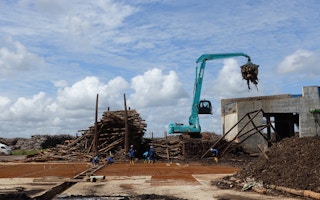Asia Pulp and Paper (APP) has not lived up to the sustainability commitments it made five years ago, a coalition of non-government organisations (NGOs) has claimed on the anniversary of the controversial paper company’s Forest Conservation Policy (FCP).
To continue reading, subscribe to Eco‑Business.
There's something for everyone. We offer a range of subscription plans.
- Access our stories and receive our Insights Weekly newsletter with the free EB Member plan.
- Unlock unlimited access to our content and archive with EB Circle.
- Publish your content with EB Premium.
The Indonesia-headquartered firm committed to stop clearing natural forest on 5 February 2013, following years of campaigning by green groups. At the time, the announcement was seen as a sustainability milestone for the company. Until that day, APP had cleared more than 2 million hectares of tropical forests over 34 years of operations in Indonesia, according to a report by Eyes on the Forest.
To mark five years since the launch of the FCP, a group of 10 NGOs, including World Wide Fund for Nature (WWF), Indonesia-based Hutan Kita Institute and British advocacy group Forest Peoples Program, has issued a joint statement claiming that APP is “not yet on a sustainable track” and the progress it has made has “not been sufficient.”
Among their claims is that despite promising to halt deforestation, APP built one of the world’s largest pulp mills at the start of last year without—according to the NGOs’ calculations, which the company says are wrong—an adequate supply of plantation timber to feed it.
“When the wood supply faces a crunch, we fear the company will resume clearing Indonesia’s rainforests,” the statement reads.
A more recent doubt cast over APP’s zero-deforestation policy came in December last year, when a report by the Associated Press (AP) found that the company had been falsely claiming that some its major timber suppliers were independent when, in fact, they have close ties to APP and its parent company Sinar Mas.
One example of that is PT. Muara Sungai Landak in West Kalimantan, which has reportedly been clearing natural forest and developing carbon-rich peat lands since 2014. AP’s report found that the company has links to Sinar Mas Forestry, a connection that APP denies.
“
Over the last five years since the launch of the FCP, APP has made significant strides in its sustainability journey. This is something that is widely recognised. This is not to say that the progress made has been perfect.
Bernard Tan, managing director, global communications, Asia Pulp and Paper
The second criticism of APP’s five-year sustainability track record is how it manages conflicts with people whose lands, forests and livelihoods have been affected by the company’s expanding operations in Indonesia. APP has claimed to have resolved 42 disputes, but hundreds are believed to be outstanding, the statement reads.
A third criticism centres on APP’s lack of progress on a commitment it made in 2013 to restore 1 million hectares of Indonesian forest.
“APP still has no plan to manage peatlands sustainably, either for economic use without peat drainage or restoration of natural vegetation, to curb APP’s contribution to climate change and stop peatland subsidence that could lead to flooding,” the report reads.
Misinformation and a lack of transparency over its suppliers and how it is implementing its FCP commitments is another major grievance the NGOs have.
The group points to the Associated Press revelations, and asserts that APP claimed a number of its suppliers were independent to avoid responsibility for massive fires near its new mill in South Sumatra in 2015—which led to Southeast Asia’s worst haze season on record.
Finally, the NGOs suggest that there has been no independent verification of APP’s progress, although consultancies such as Rainforest Alliance and The Forest Trust have produced progress reports commissioned by APP that showed mixed progress. The company has “continued to self-declare its unverified progress through its marketing campaigns,” the NGOs claim.
In response, Bernard Tan, APP’s managing director for global communications and Singapore country president for Sinar Mas, admitted that the company’s record in sticking to its sustainability commitments has not been “perfect,” without detailing exactly where APP was struggling.
“Over the last five years since the launch of the FCP, APP has made significant strides in its sustainability journey. This is something that is widely recognised. This is not to say that the progress made has been perfect,” Tan told Eco-Business.
He said that the company notes the concerns of the NGOs, and even though some have already been addressed, is “prepared to revisit them and address these concerns in a manner that allows for progress.”
“APP also acknowledges that it has room for improvement and is open to engaging with any party that has objective suggestions on how we can improve our sustainability performance under the FCP,” he said. “Nevertheless APP’s commitment to the FCP remains steadfast.”
The NGOs’ statement include six recommendations for APP.
These include disclosing data on pulp production and wood supply for an independent audit, publishing data on land conflicts and potential land swap areas, and inviting NGOs to observe both these processes.
They also called for a plan for phasing out all drainage in plantations on peatland, and for the company to take responsibility for the peatlands it is responsible for damaging.
Finally, the NGOs have called on APP to disclose all connections the company and its holding group Sinar Mas have with pulpwood concessions in Indonesia “to reveal its total environmental and social footprint.”








